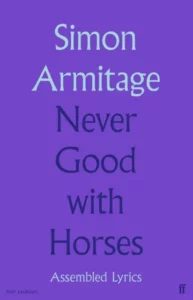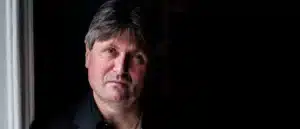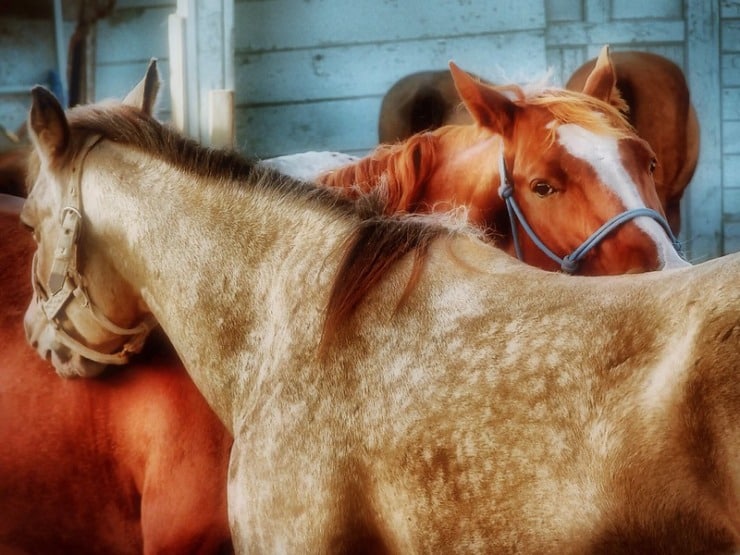Poet Simon Armitage writes lyrics and performs with a band
British Poet Laureate Simon Armitage has translated medieval poems like Pearl and Sir Gawain and the Green Knight. He’s tackled The Odyssey. He’s written plays, like one about the last days of Troy. He’s written novels and published numerous poetry collections. He’s retold the death of King Arthur and published two poetry travel books.
And, perhaps most surprisingly, this most literate of literary writers has also performed in two bands and written the lyrics for a considerable number of songs.
Perhaps I shouldn’t be surprised. Poet Malcom Guite (another Brit) found time from his day job as Cambridge University college chaplain to perform in a band (he retired from the day job but still performs in gigs). And in 2016, American Bob Dylan won the Nobel Prize for Literature. The literary times, they are a-changin’.
In his new publication Never Good with Horses: Assembled Lyrics, Armitage says right up front that “song lyrics are not poems and poems are not song lyrics.” The primary reason is that song lyrics come packaged with the significant element of music, which can change everything about the words.
That said, however, when I read the lyrics of his songs, I had to question that bold, declarative statement. It’s true that music can change words and their meaning, not unlike the way the human voice can turn what’s rather trite and boring on a printed page into a speech that’s moving and meaningful. Many of Armitage’s song lyrics were written for the two bands he’s co-founded and played with — the indie pop band Scaremongers and his current band, Land Yacht Regatta, or LYR, as he calls it.
I tried an experiment. I first read the collection’s title poem, “Never Good with Horses.” Then I watched a YouTube video recording of LYR performing it (with Armitage doing the lyrics). There’s no question that the music pulls the words into an elevated experience that the words by themselves don’t, or can’t. But the words alone also offer an intriguing composition that I would call a poem: “You were happiest in the darkroom / conjuring shadows and shades, / running film through your dry fingers, / keeping ghosts in their graves.”
Songs almost invariably have a rhyming scheme. In that sense, they’re more akin to formalist or traditional poetry. And they usually include a repeated chorus, or something like a repeated chorus. And songs, as Armitage says, are meant to be paired with music. But their words can often stand by themselves as a poem, or something near a poem.
Armitage wrote these lyrics for LYR. I might have bonded with this one because of the large amount of time I recently spent recently in art gallery and heritage building gift shops, and how the staff at the Courtauld Gallery in particular seemed rush and harried, surrounded by all of the various bits of merchandise.
Guernica Jigsaw

of the gallery gift shop,
staggers out punch-drunk
for a half-hour lunch break.
Then roams the Zen gardens
of the gentrified margins,
strolls through riotous petals
forged from recycled metals.
Who will buy my Guernica jigsaw?
Who will buy my Mondrian stress ball?
Basquiat skateboard,
Lichenstein snow globe,
Oven glove Kahlo,
Shower cap Rothko.
What’s not to love – the Brancusi lampshade.
What’s not to love – the Kandinsky phone case.
The store she works in
sells Paisley and snakeskin.
She thinks vintage thoughts among
camel hair coats.
They pass on the escalators
between Argos and Specsavers,
fazed by abstract sculpture
in the City of Culture.

Simon Armitage
Armitage has published several collections of poetry, including The Dead Sea Poems (1998), Kid (1999), Killing Time (1999), The Universal Home Doctor (2004), Book of Matches (2010), Seeing Stars (2011), The Shout (2014), Paper Aeroplane: Selected Poems 1989-2014 (2015), and The Unaccompanied (2017). He’s written accounts of travels in Britain, including Walking Home: A Poet’s Journey (2013) and Walking Away (2016), and two novels, Little Green Man (2001) and White Stuff (2005). He’s also published translations and retellings of several classic works, including Sir Gawain and the Green Knight, The Odyssey: A Dramatic Retelling of Homer’s Epic (2008), The Death of King Arthur (2012), The Story of the Iliad (2015), and The Last Days of Troy (2016).
Few people will fall on their swords arguing that a song is a song and a poem is a poem and never the twain shall meet. Armitage notes the argument, but he moves on. Yes, it’s hard work, but he seems to be having an enormously good time using words to write poems, lyrics, plays, novels, translations, and retellings. Whether it’s a song or a poem, he relishes and celebrates all of the things were can do.
And sometimes, you can set them to music.
Related:
Simon Armitage and The Owl and the Nightingale
The Enduring Appeal of Sir Gawain and the Green Knight
Simon Armitage Translates Pearl
Simon Armitage, the New British Poet Laureate
Photo by Rvs 1966, Creative Commons, via Flickr. Post by Glynn Young.
How to Read a Poem uses images like the mouse, the hive, the switch (from the Billy Collins poem)—to guide readers into new ways of understanding poems. Anthology included.
“I require all our incoming poetry students—in the MFA I direct—to buy and read this book.”
—Jeanetta Calhoun Mish
- Longfellow’s “Paul Revere’s Ride”: Creating a National Legend - April 17, 2025
- Poets and Poems: Katie Kalisz and “Flu Season” - April 15, 2025
- Poets and Poems: Michelle Ortega and “When You Ask Me, Why Paris?” - April 10, 2025


Leave a Reply